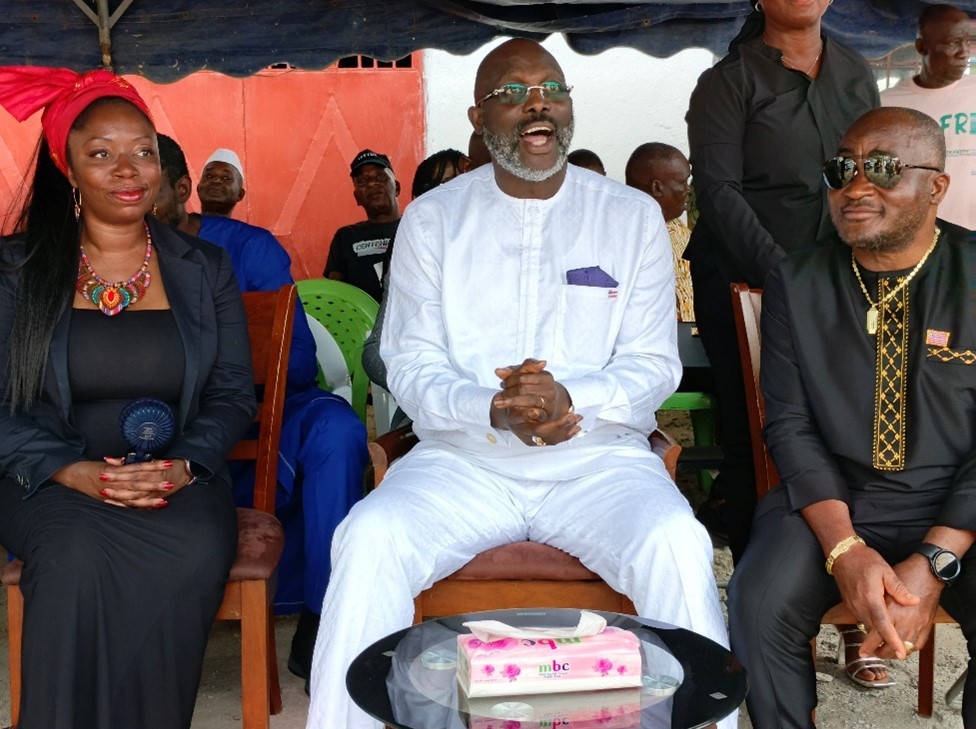The passing of former Liberian First Lady, Nancy B. Doe, prompted a significant gesture of reconciliation from former President George Weah, who visited the bereaved family and offered condolences amidst prior criticism for his alleged neglect of Mrs. Doe during her lifetime. This visit, laden with symbolism and emotion, underscored the complex interplay of personal relationships, political dynamics, and regional affiliations within Liberia. Weah’s presence at the Doe family home in Sinkor, Monrovia, marked a public attempt to mend fences after facing accusations, particularly from the deceased’s daughter, Veronica Mamie Doe, of mistreatment and indifference towards her mother. Mamie Doe’s previous public condemnation of Weah highlighted a rift between the two families, adding a layer of tension to the already emotionally charged atmosphere surrounding the former First Lady’s passing.
Weah’s visit was framed as an appeal for unity among Southeasterners, the shared region of origin for both Weah and the Doe family. This region, known for its active political landscape, became the focal point of Weah’s message, as he cautioned against allowing political differences to fracture the bonds of kinship. His words emphasized the shared heritage and the importance of maintaining solidarity, particularly in the face of loss. This appeal for unity served as both an acknowledgement of the political undercurrents and a plea to transcend them in a time of mourning. The historical connection between Weah and the late President Samuel K. Doe, Nancy’s husband, further complicated the narrative. Doe’s patronage of Weah during his burgeoning football career underscored a past relationship that added layers of meaning to Weah’s present actions. This prior connection highlighted the intricate web of personal histories that often intersect with political realities in Liberia.
Weah’s expression of remorse and his acknowledgment of past shortcomings formed a central part of his condolence visit. His tearful apology, offered on behalf of himself, his family, and his political party, the Congress for Democratic Change (CDC), directly addressed the accusations of neglect. This public act of contrition sought to address the grievances expressed by Mamie Doe and to signal a genuine desire for reconciliation. By referencing his limited personal interactions with the former First Lady, Weah attempted to explain, without justifying, his past behavior. This acknowledgement of past failings seemed aimed at demonstrating humility and taking responsibility for his actions. Weah’s emphasis on the importance of peace and unity resonated with the overall theme of his visit. By framing his apology within a broader call for reconciliation, he attempted to move beyond the personal and address the wider implications of division within the Southeastern community.
Beyond words of condolence, Weah offered a substantial material contribution to the bereaved family, including a significant sum of money, rice, and livestock. This gesture, customary in Liberian tradition, served as a tangible expression of sympathy and support. The donation, while significant in itself, also carried symbolic weight, representing a concrete attempt by Weah to bridge the divide and demonstrate his commitment to the Doe family. Mamie Doe’s response to Weah’s visit, acknowledging their first-ever encounter, further underscored the strained relationship between the two families. Her public statement, made before a large audience, highlighted the significance of Weah’s gesture and the potential for healing and reconciliation. The fact that this was their first meeting added a poignant layer to the event, suggesting the possibility of a new chapter in their relationship.
Weah’s visit to the Doe family home was more than a simple act of condolence; it was a complex and layered event, freighted with political and personal significance. It represented an attempt to mend fractured relationships, to address past grievances, and to promote unity within a politically sensitive region. The visit underscored the intertwined nature of personal histories and political dynamics in Liberia, highlighting how past actions and relationships can continue to shape present events. The public nature of both the accusations and the apology further amplified the event’s resonance, turning it into a moment of national significance and a potential turning point in the relationship between two prominent Liberian families.
Finally, Weah’s actions highlighted the importance of reconciliation and forgiveness in the context of national healing. His public apology and call for unity served as a reminder of the need to transcend political divisions and personal grievances in the pursuit of a more cohesive and peaceful society. The event, while centered on a personal tragedy, carried broader implications for the political landscape of Liberia, suggesting the potential for healing and reconciliation at both the individual and communal levels. The lasting impact of this gesture, however, remains to be seen, dependent on the willingness of both families and the broader Southeastern community to embrace the spirit of unity and reconciliation that Weah sought to promote.














